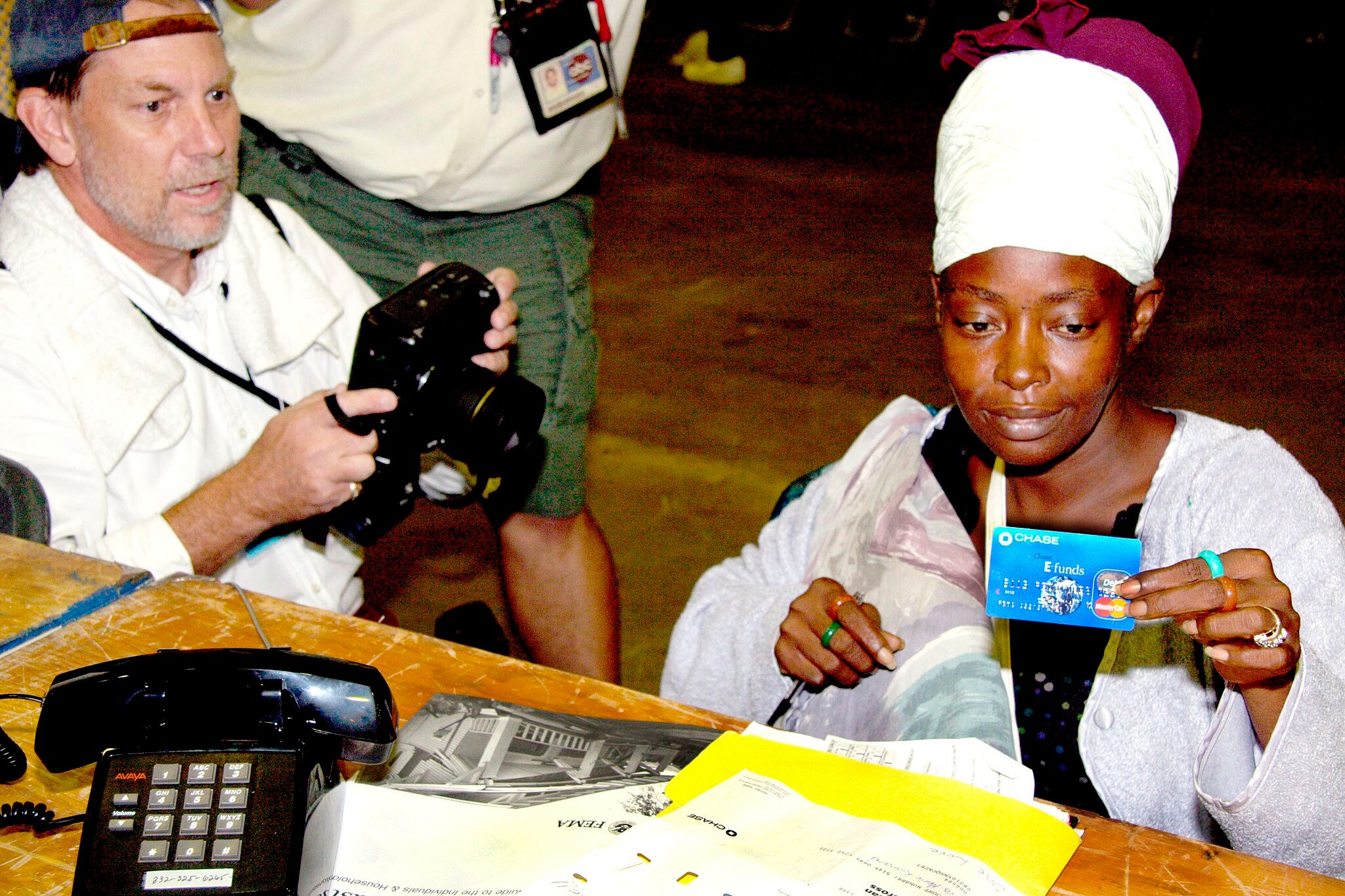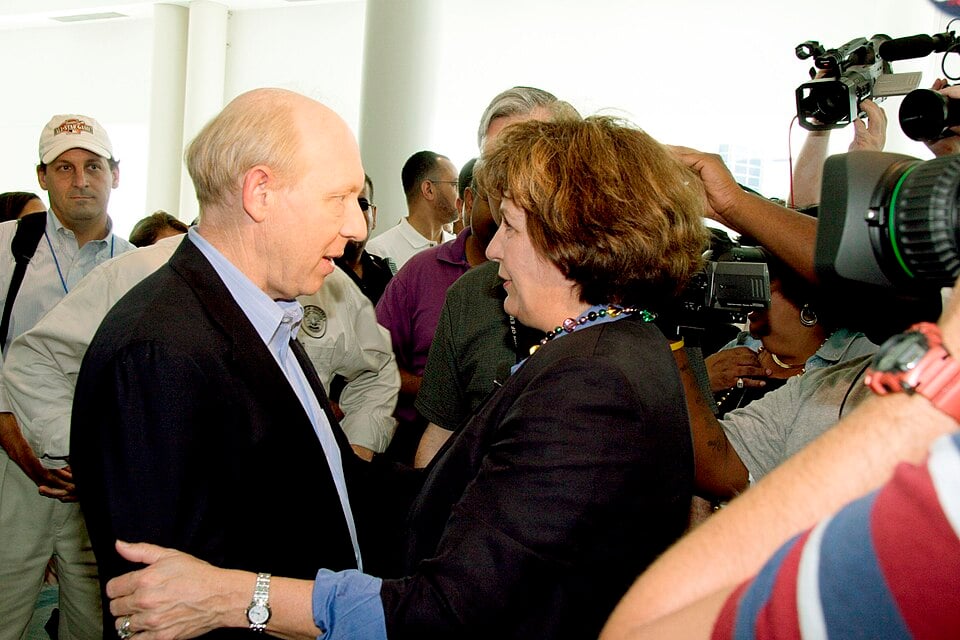Editor’s Note: Join us Wednesday evening for a joint event sponsored by Mother Jones, the Texas Observer, and Capital B. “The Lingering Storm” will revisit one of the nation’s deadliest storms and how to prepare for the future—in downtown Houston or online via motherjones.com/stream.
Twenty years ago, when the nation’s most deadly modern hurricane approached New Orleans, Eva Kinnard didn’t have a car or the money to leave her apartment on her own. She was still recovering from surgery—limping around on a foot with a healing cut. Like others in the Crescent City, she figured she could ride out the storm with her teenage children. The eldest was pregnant.
“We lived in Uptown on Hickory in an apartment. I had four children—at the time they were in 9th, 10th, 11th, and 12th grade,” she recalled in an interview with the Texas Observer. “Our whole house flooded.”
The State of Louisiana and the city both had official evacuation plans in place. New Orleans had an extensive public transportation system and a fleet of school buses to serve its 485,000 residents; many locals in flood-prone homes, like Kinnard, lacked cars or the means to leave—including nursing home and hospital patients and prisoners in the Orleans Parish jail. And yet, plans weren’t carried out. Public buses and school buses remained parked in lots that soon flooded.
 Eva Kinnard (right) on September 9, 2005, in Houston (Ed Edahl/FEMA)
Eva Kinnard (right) on September 9, 2005, in Houston (Ed Edahl/FEMA)Alta R. Pierce didn’t want to leave her home of 64 years in Gentilly, a middle-class neighborhood that borders Lake Pontchartrain. Like many older residents, the 95-year-old with a heart condition had survived other big storms. After the winds calmed, she sat alone on her front porch and watched the muddy waters rise.
Endya Carter was only 8 and lived with her parents in Gentilly when the storm hit. She recalled in a video for the storm’s 20th anniversary that her daddy was “a stubborn man. So he didn’t believe in leaving.” In fact, he was talking about attending a party as the storm blew in. It wasn’t up to her; she was still in elementary school.
For a while after Hurricane Katrina blew through on the morning of August 29, 2005, the sun shone—and it wasn’t clear that everyone who’d hunkered down was in danger of anything besides having to endure the heat without any electricity, while subsisting on unappetizing canned goods and other dwindling storm supplies. Few knew that the 17th Street Canal levees had already been breached and that soon levees would fail in more than 50 places, flooding 80 percent of the low-lying city. And then neither FEMA, the National Guard, the state, nor anyone else would deploy enough people, equipment, or other resources in time to keep more than 1,400 people from dying.
The waters kept rising, forcing Kinnard to wade to higher ground with her children and her bum foot. She traversed waters filled with corpses and sewage and other things she didn’t want to identify. Pierce’s neighbor swam over to her house and flagged down a passing boat. Kinnard, Pierce, and many others ended up stranded on interstate highway bridges that became islands in the city.
Carter and her family—and so many more stranded people—clambered up to the rooftops of their homes. They waited three days before being taken by canoe to the deserted University of New Orleans campus, which was closed and locked. Without food or water supplies, some raided closed shops to survive, Carter said. While trapped, she witnessed suicides and rapes, images she never forgot, as she later recalled in the anniversary series of storm survivor videos. “You don’t forget it. You might try to suppress your memory. But it’s still going to come up, especially if you’re in that type of situation again.”
Eventually, the three women ended up in Texas, a Gulf state with storm troubles of its own. In all, Katrina displaced about a million people, one of the largest mass migrations provoked by an environmental disaster since the Great Dust Bowl. Houston took in somewhere between 150,000 and 300,000 partly because of the quick action of the city’s then-mayor, Bill White.
As Katrina approached, White was closely monitoring the National Hurricane Center and the National Weather Service as high winds and a storm surge struck New Orleans, a port city that, like Houston, is low-lying and sinking fast. Like most Gulf Coast residents, White, an attorney and a public policy wonk, had survived other storms and, out of necessity, become something of an amateur meteorologist. He knew well the story of the 1900 hurricane that stole 10,000 to 12,000 lives and turned nearby Galveston into a sleepy waterlogged tourist town forced to hide behind its seawall. That storm eventually transformed swampy Houston, rather than its island neighbor, into Texas’ biggest city.
White had become more invested in watching hurricanes as mayor. When storms struck Houston, his job included deciding when to call for evacuations, a difficult task given that even with updates from the National Hurricane Center coastal storms can weaken or strengthen at the last minute or swerve and strike many miles from where they’re predicted to make landfall. He knew that calling for an evacuation too soon or too late could backfire. And that in a storm’s aftermath, help can fail to arrive in time.
Based on news coverage, it seemed that the people of New Orleans had been spared the worst, with the storm making landfall east of the city and storm surges hitting other Southeast Louisiana parishes and Mississippi harder. Then White got a phone call from a Shell executive with oil interests along the coast: The levees had broken. “And I knew what that meant,” White told the Observer. “It meant that one of the largest U.S. cities and one of our largest nearby neighbors would become a city that was uninhabitable.”
White knew too few people had evacuated. There was no script for what to do next.
Meanwhile, the Rev. Lennox Yearwood, a Louisiana-born pastor, organizer, and Air Force veteran who then lived in Washington, D.C., was watching the storm coverage—and worrying. He wasn’t just concerned about his friends and family. Yearwood had, a year prior, founded a community action group called the Hip Hop Caucus, where he served as both CEO and president. His group worked to ally artists and activists and form action plans. Yearwood knew some New Orleans organizers had intentionally stayed in harm’s way, initially in order to try to protect older relatives and neighbors and later to help pull bodies out of the water. He knew others faced imminent danger in flood-prone confined spaces, like the parish jail where the water was rising and there were limited supplies of fresh water and food. And, as an environmental activist, he worried about fellow Louisianans living near hard-hit hazardous chemical plants on “Cancer Alley.”
While others were watching helplessly, Yearwood began to act. He used his new nonprofit to focus on the core issues impacting underserved communities and find solutions for survivors. “The key thing here is what can we do to ensure that our people are prepared so they’re not left behind. What can we do to ensure that the issues of the climate crisis are being dealt with and responded to? And also, what can we do to ensure that our people aren’t looked upon … [as] victims, but as those who have been resilient and very powerful?”
Back in Houston, White made a tough decision. He told his top lieutenants that they’d need to run the city without him while he ran an unusual rescue operation. “I convened all senior staff and said that I wanted to keep the city functioning and make sure that all city services were preserved, but I was going to be busy for months on end.”
White called the Red Cross, then opened up Houston’s Astrodome, football stadium, and convention center to anyone with no other place to go. He made calls and convened Houston’s business, religious, medical, and nonprofit leaders to plan the impromptu operation.
 Bill White greets Louisiana Governor Kathleen Blanco in Houston on September 11, 2005. (Ed Edahl/FEMA)
Bill White greets Louisiana Governor Kathleen Blanco in Houston on September 11, 2005. (Ed Edahl/FEMA)Meanwhile, Yearwood began to advocate for survivors who had been targeted during and after the storm. Some had been arrested or shot after breaking into stores for vital food, medicine, or water after being stranded. Many were returning to unsafe waterlogged homes filled with mold, where some were scammed by repairmen or lied to about how soon government relief money might arrive. Over time, he established the Gulf Coast Renewal Campaign, a coalition of national and grassroots organizations to advocate for survivors. “And one of the things we kind of learned from that is that while we definitely need to have a well-resourced FEMA, we also need to have what we call a PEMA, a People’s Emergency Management Agency, where we take care of one another.”
Kinnard, Pierce, and Carter all ended up sheltering in Houston. Kinnard and her children went to the Astrodome first and later to a subsidized apartment in Houston. They had only their muddy clothes. She told the Observer that, while she and her children survived the storm, her daughter’s baby did not. The unborn child was killed, she said, when a school bus full of evacuees hit a bump, sending her pregnant daughter flying up into the air. They buried him in a Houston cemetery, she recounted.
Others remained in Texas, but Kinnard, Pierce, and Carter all returned to their city.
Most of New Orleans had been reduced to ruins after the storm, and most of the homes left standing had to be gutted and rebuilt. Mardi Gras and Jazz Fest eventually resumed. As of 2006, New Orleans had lost half its pre-Katrina population. Twenty years later, it’s still about 25 percent smaller.
Yearwood’s Hip Hop Caucus helped co-found the Katrina Commemoration Foundation, which organizes an annual Katrina Second Line and March that begins at the levees that breached in the Ninth Ward and ends some four miles later with the reading of the names of the dead. He thinks that the official storm death estimates are too low; he pegs the number at more than 1,800 including those who died “of heartbreaks.”
Pierce never returned to her home; she ended her years in a New Orleans retirement center. At first, it looked like her heavily damaged house would be torn down. The journalist Karen Gadbois featured it in a series, called “Squandered Heritage,” about how many historic houses were lost after Katrina. But Pierce’s house survived: A young man bought it, gutted it, and gave it new life.
Carter eventually attended the same university that once served as a shelter for her family, though she struggles to forget some things she witnessed there. Her story is featured in a series of films on “Weathering the Storm” that the Hip Hop Caucus released for Katrina’s 20th anniversary.
Some stayed in Texas in part because they had no other home left, Yearwood said. For the 20th anniversary, many of those Katrina Texans formed a caravan and participated in a Second Line and remembrance of the dead.
“New Orleans is special: We have a very unique spirit,” Yearwood told the Observer. “We have a very fighting spirit, and I think that’s one of the reasons why we are still here today.”
The post Twenty Years Later, Katrina Still Haunts the Gulf from New Orleans to Houston appeared first on The Texas Observer.
 (2).png)
 3 months ago
813
3 months ago
813





 English (US)
English (US)